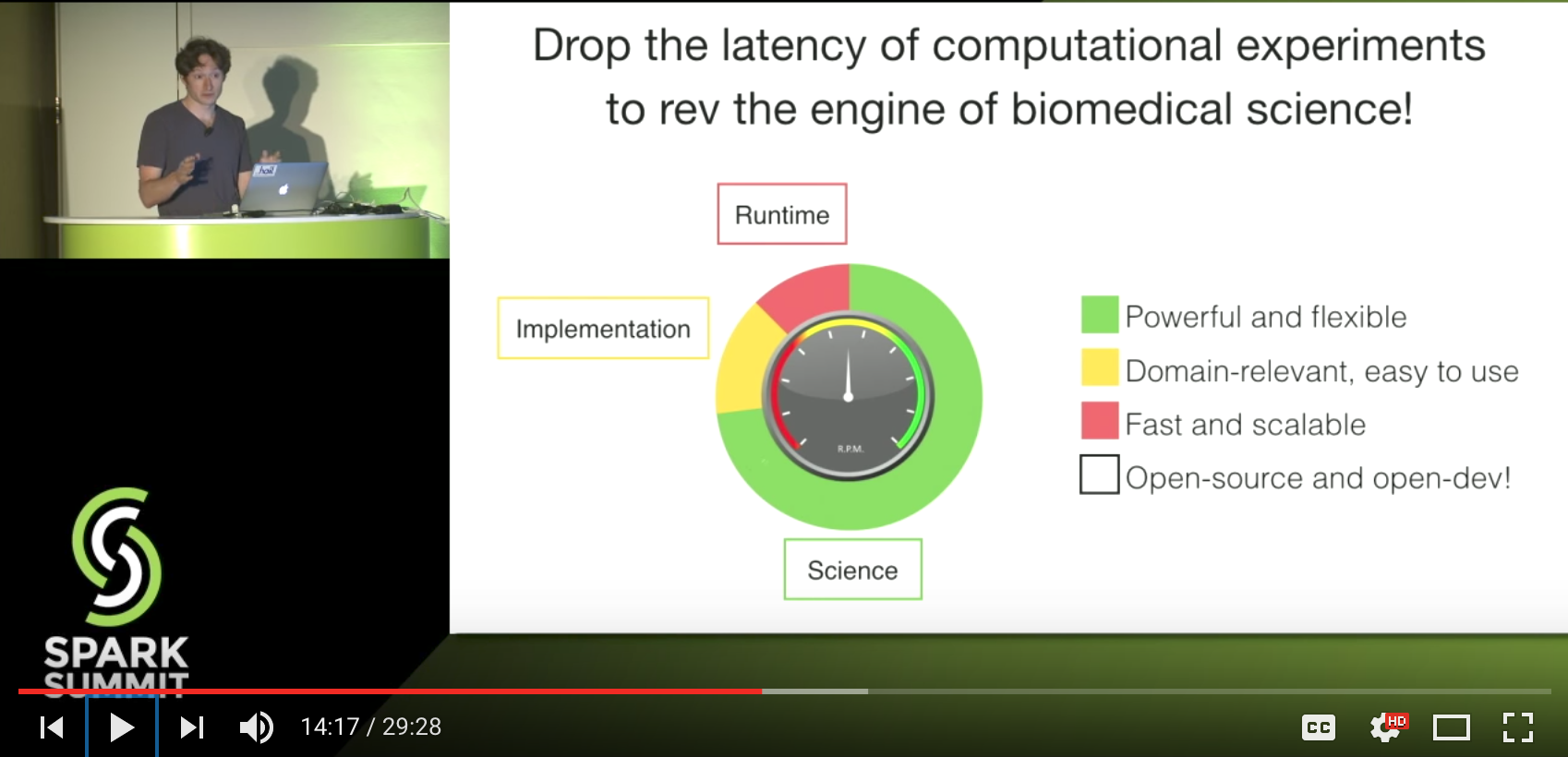Hail is an open-source, scalable framework for exploring and analyzing genomic data.
The Hail project began in Fall 2015 to empower the worldwide genetics community to harness the flood of genomes to discover the biology of human disease. Since then, Hail has expanded to enable analysis of large-scale datasets beyond the field of genomics.
Here are two examples of projects powered by Hail:
- The gnomAD team uses Hail as its core analysis platform. gnomAD is among the most comprehensive catalogues of human genetic variation in the world, and one of the largest genetic datasets. Analysis results are shared publicly and have had sweeping impact on biomedical research and the clinical diagnosis of genetic disorders.
- The Neale Lab at the Broad Institute used Hail to perform QC and genome-wide association analysis of 2419 phenotypes across 10 million variants and 337,000 samples from the UK Biobank in 24 hours. These results are also publicly available, see the Neale Lab blog for more info.
For genomics applications, Hail can:
- flexibly import and export to a variety of data and annotation formats, including VCF, BGEN and PLINK
- generate variant annotations like call rate, Hardy-Weinberg equilibrium p-value, and population-specific allele count; and import annotations in parallel through the annotation database, VEP, and Nirvana
- generate sample annotations like mean depth, imputed sex, and TiTv ratio
- generate new annotations from existing ones as well as genotypes, and use these to filter samples, variants, and genotypes
- find Mendelian violations in trios, prune variants in linkage disequilibrium, analyze genetic similarity between samples, and compute sample scores and variant loadings using PCA
- perform variant, gene-burden and eQTL association analyses using linear, logistic, and linear mixed regression, and estimate heritability
- lots more!
Hail's functionality is exposed through Python and backed by distributed algorithms built on top of Apache Spark to efficiently analyze gigabyte-scale data on a laptop or terabyte-scale data on a cluster.
Users can script pipelines or explore data interactively in Jupyter notebooks that combine Hail's methods, PySpark's scalable SQL and machine learning algorithms, and Python libraries like pandas's scikit-learn and Matplotlib. Hail also provides a flexible domain language to express complex quality control and analysis pipelines with concise, readable code.
To learn more, you can view our talks at Spark Summit East and Spark Summit West (below).
There are currently two versions of Hail: 0.1 (stable) and 0.2 beta (development).
We recommend that new users install 0.2 beta, since this version is already radically improved from 0.1,
the file format is stable, and the interface is nearly stable.
To get started using Hail 0.2 beta on your own data or on public data:
- install Hail using the instructions in Getting Started
- read the Overview for a broad introduction to Hail
- follow the Tutorials for examples of how to use Hail
- check out the Python API for detailed information on the programming interface
As we work toward a stable 0.2 release, additional improvements to the interface may require users to modify their pipelines
when updating to the latest patch. All such breaking changes will be logged here.
See the Hail 0.1 docs to get started with 0.1. The Annotation Database and gnomAD distribution are currently only directly available
for 0.1 but will be updated for 0.2 soon.
There are many ways to get in touch with the Hail team if you need help using Hail, or if you would like to suggest improvements or features. We also love to hear from new users about how they are using Hail.
- chat with the Hail team in our Zulip chatroom.
- post to the Discussion Forum for user support and feature requests, or to share your Hail-powered science
- please report any suspected bugs to github issues
Hail uses a continuous deployment approach to software development, which means we frequently add new features. We update users about changes to Hail via the Discussion Forum. We recommend creating an account on the Discussion Forum so that you can subscribe to these updates.
Hail is committed to open-source development. Our Github repo is publicly visible. If you'd like to contribute to the development of methods or infrastructure, please:
- see Getting Started Developing for info on compiling Hail
- chat with us about development in our Zulip chatroom
- visit the Development Forum for longer-form discussions
The Hail team is embedded in the Neale lab at the Stanley Center for Psychiatric Research of the Broad Institute of MIT and Harvard and the Analytic and Translational Genetics Unit of Massachusetts General Hospital.
Contact the Hail team at [email protected].
Follow Hail on Twitter @hailgenetics.
If you use Hail for published work, please cite the software:
We would like to thank Zulip for supporting open-source by providing free hosting, and YourKit, LLC for generously providing free licenses for YourKit Java Profiler for open-source development.



